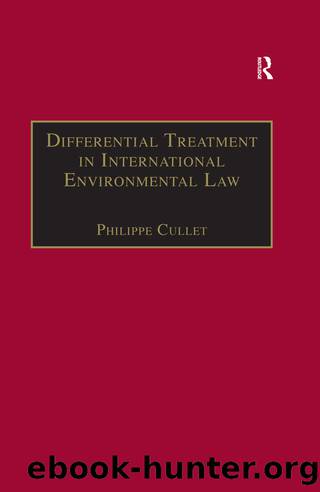Differential Treatment in International Environmental Law by Cullet Philippe;

Author:Cullet, Philippe;
Language: eng
Format: epub
Publisher: Taylor & Francis Group
The Global Environment Facility
The Global Environment Facility (GEF) is by far the biggest financial mechanism specifically devoted to global environmental problems. It derives its significance not so much because of the resources at its disposal, which remain tiny compared to overall development aid, but mostly because of its innovative governance structure and guiding principles. The GEF was first set up in 1991 by the World Bank to specifically address some of the existing global environmental problems and was restructured in 1994.76 Its mission is to provide new and 'additional grant and concessional funding to meet the agreed incremental costs of measures to achieve agreed global environmental benefits',77 The notion of new and additional resources has remained contentious since it has not been defined in treaties and can therefore not be easily operationalized.78
One of the main characteristics of the GEF is its focus on the distinction between local and global environmental benefits. The concept of incremental costs has been developed to assess global and local benefits and determine the specific cost related to the protection of the global environment.79 The GEF only covers the difference between the cost of a project undertaken with global environmental objectives in mind and the cost of an alternative that the recipient country would have implemented in the absence of global environmental concerns. It is thus only when global benefits 'cost' more than the base scenario that GEF funding can be obtained.80 A number of other principles guide GEF activities. GEF resources must be additional to current aid budgets. GEF activities must be based on national priorities designed to support sustainable development and be cost-effective. Finally, eligibility for GEF funding is limited to countries which are eligible to borrow from the World Bank or are eligible recipients of UNDP technical assistance through their Indicative Planning Figure.81 The GEF has focused until now on four global problems. These are climate change, biological diversity, international waters and the depletion of the ozone layer. Land degradation issues have been taken into account insofar as they relate to one of the four focal areas enumerated above.82 Other global environmental problems are not included in the GEF mandate. Following criticism that the GEF fails to address some important global environmental issues, a proposal has been put forward to amend the GEF 1994 Instrument and to include among the focal areas land degradation and persistent organic pollutants.83
The GEF is particularly noteworthy in the context of differential treatment for two reasons. Firstly, its governance structure warrants attention since it is novel in the context of aid mechanisms. The Council, the main decision making organ, has 16 members from developing countries, 14 from developed countries and 2 from the former communist countries.84 In principle, decisions are taken by consensus. However, if a vote is called for, decisions must be adopted by a 60 per cent majority of both the total number of participants and total contributions.85 Though some recipient countries contribute to the trust fund, most of the funds come from developed countries. The
Download
This site does not store any files on its server. We only index and link to content provided by other sites. Please contact the content providers to delete copyright contents if any and email us, we'll remove relevant links or contents immediately.
The Thirst by Nesbo Jo(6932)
Permanent Record by Edward Snowden(5838)
The Myth of the Strong Leader by Archie Brown(5499)
Spare by Prince Harry The Duke of Sussex(5176)
A Higher Loyalty: Truth, Lies, and Leadership by James Comey(4954)
Secrecy World by Jake Bernstein(4741)
Adulting by Kelly Williams Brown(4565)
The Borden Murders by Sarah Miller(4313)
Machine Learning at Scale with H2O by Gregory Keys | David Whiting(4292)
Killers of the Flower Moon by David Grann(4039)
American Kingpin by Nick Bilton(3875)
The Secret Barrister by The Secret Barrister(3696)
Fear by Bob Woodward(3692)
Future Crimes by Marc Goodman(3592)
The Last Girl by Nadia Murad(3505)
The House on Mango Street by Sandra Cisneros(3463)
Liar's Poker by Michael Lewis(3441)
Oathbringer (The Stormlight Archive, Book 3) by Brandon Sanderson(3156)
The Social Psychology of Inequality by Unknown(3018)
